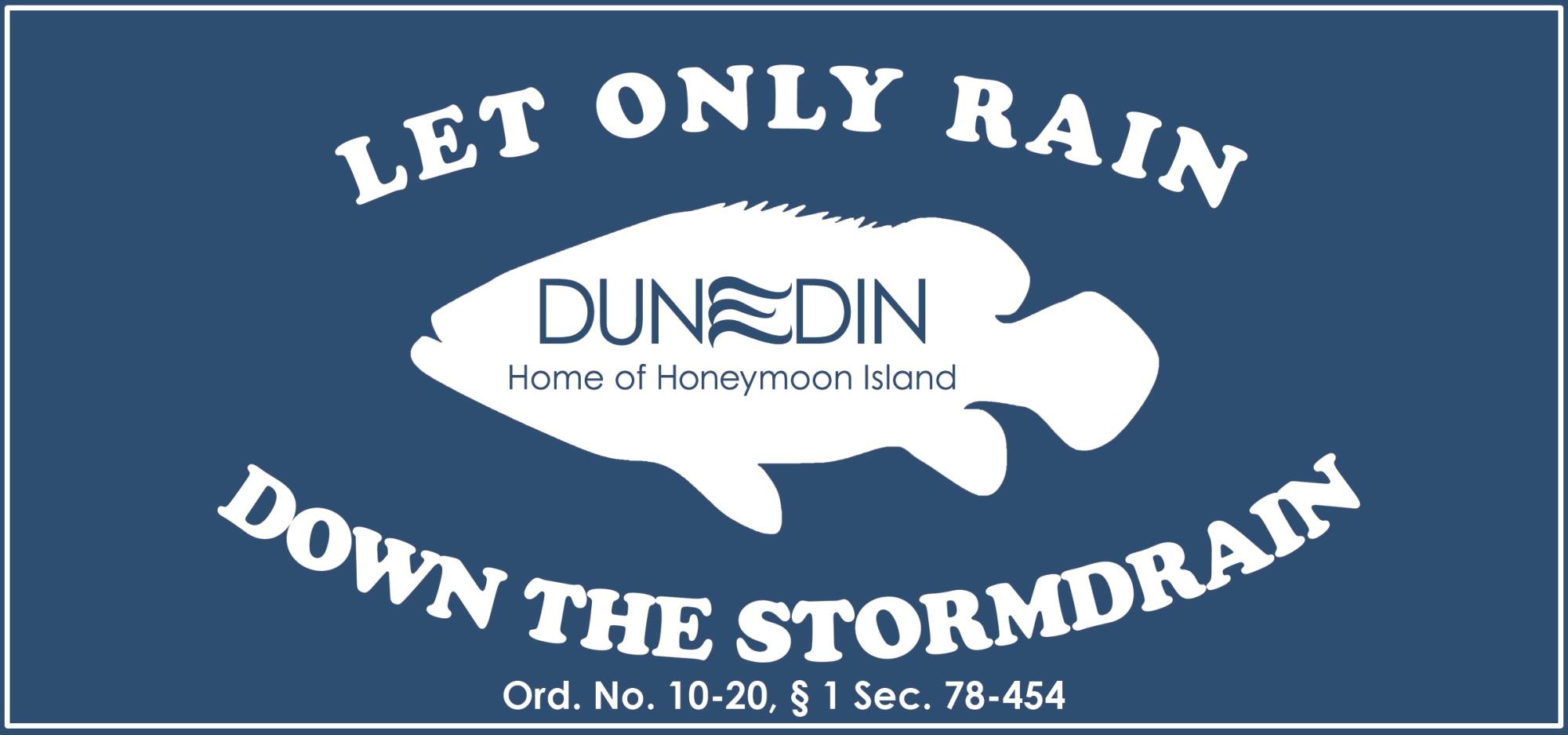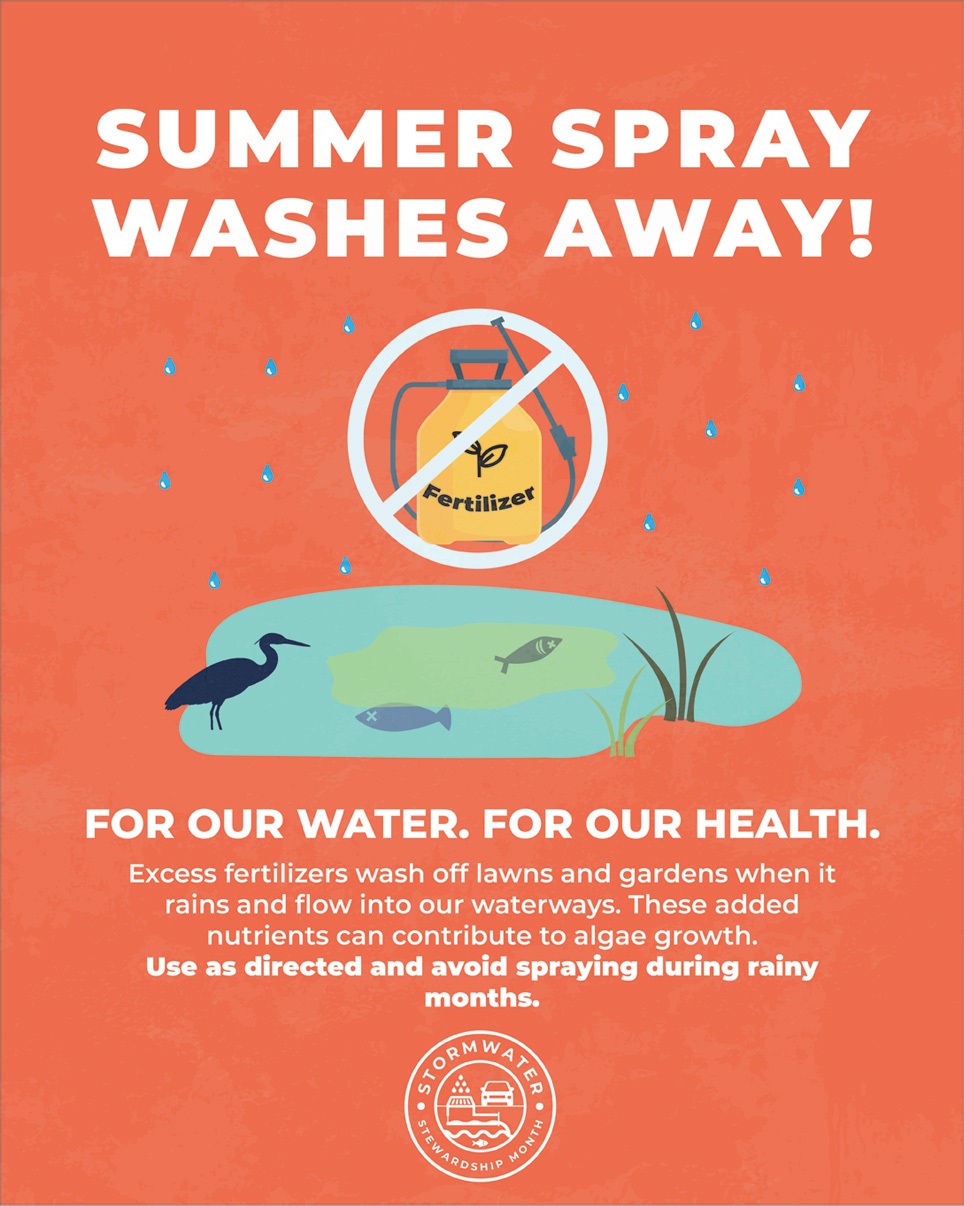
Only Rain Down the Storm Drain
You may have noticed the markers that are on several storm drains throughout the city. This educational campaign is focused on preventing illicit discharges, which are any pollutants or non-stormwater substances entering storm drains or waterways. These discharges can include chemicals, sediment, oils, or waste, which can harm the environment and water quality. The campaign encourages the community to keep storm drains clear of anything other than rainwater -- with a few exceptions, such as water from firefighting, air conditioning condensation, and landscape irrigation -- as specified in the City of Dunedin’s Code of Ordinances on Stormwater Management. The message highlights the importance of keeping stormwater systems clean and protecting local waterways for the health and safety of the community. The call to action emphasizes the city’s efforts against pollution, urging residents to be mindful and contribute to preserving a cleaner environment.
Storm Drain Mural Painting Program
This program, pioneered by Environmental Specialist, Nicole Silverman, and funded by the Tampa Bay Regional Planning Council and the Florida Department of Transportation, invited student artists of all ages from Pinellas County to submit 2D artwork for murals on four pre-selected storm drains. The campaign raises environmental awareness by incorporating the theme “Only Rain Down the Drain,” highlighting the importance of protecting water quality and preventing pollution. Submissions were reviewed by the City’s Arts & Culture Advisory Committee, with the selected designs now set to be installed on the storm drains throughout Dunedin, serving as lasting public art pieces that promote environmental sustainability.
Make a Difference
Stormwater runoff can have a significant impact on the environment, but everyone has the power to play a part in making positive change. Here are simple actions you can take to help protect Dunedin’s water quality and the local ecosystem:
1. Only Rain Down the Drain
Avoid dumping oil, trash, or household chemicals down storm drains. These materials pollute our waterways and harm wildlife.
2. Properly Dispose of Hazardous Materials
Safely dispose of household chemicals, paints, and other hazardous materials by contacting the Pinellas County solid waste department located at 3095 114th Ave. N., St. Petersburg, FL 33716.
Pinellas Solid Waste Department’s Contact Information: (727) 464-7500
View the Household Hazardous Waste Program’s Collection Calendar.
3. Minimize Lawn Chemicals
Instead of chemical fertilizers, pesticides, or herbicides, use natural alternatives to care for your lawn and garden. If fertilizer cannot be avoided look for those that are labeled with "16 0 8" for balanced nutrients, "0" phosphorus, and 50% "slowly available" nitrogen and make sure to follow directions as well as local regulations regarding summer bans! Please click on the link for more information regarding Pinellas County’s Fertilizer Ordinance.

4. Practice Proper Car Care
Repair Leaks: Fix oil and fluid leaks in your vehicle to prevent them from washing into storm drains.
Keep Tires Properly Inflated: This helps improve fuel efficiency and reduces tire wear.
Use Commercial Car Washes: These facilities treat the water before releasing it into the environment. Alternatively, wash your car on the grass to allow water to soak into the ground rather than pervious roadways that can allow chemicals to enter storm drains.
Drive Less: Reducing driving helps decrease runoff and pollution—opt for walking or biking instead!
5. Plant Florida-Friendly Vegetation
Choose native or drought-tolerant plants that reduce the need for chemical fertilizers and conserve water. Consider creating a rain garden in your yard to capture and filter stormwater!
6. Scoop the Poop!
Always clean up after your pet! Pet waste is a significant source of pollutants that can wash into storm drains and contaminate water bodies. Consider purchasing recycled plastic bags for waste disposal.
7. Utilize Rain Barrels
Install a rain barrel to collect rainwater for use in your garden.
8. Maintain Your Yard, Driveway, and Gutters
Regularly clear debris from your yard, driveway, and gutters to prevent stormwater from carrying pollutants into the storm drain system.
9. Get Involved in Community Clean-Ups
Join local clean-up events and workshops to help protect your community. Find out about upcoming events and volunteer opportunities on our City Calendar.
10. Report Issues
If you see issues such as clogged storm drains, pollution, or illegal dumping, report them to the proper city department!
Stormwater Program: 727-298-3232